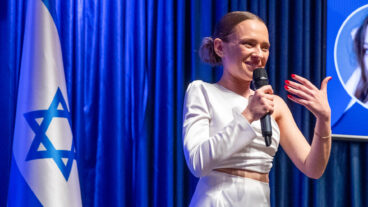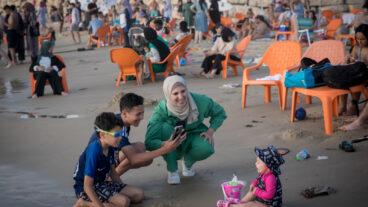Television producer Elad Kuperman’s latest reality TV show “Of All the Girls in the World” will try to find a woman for a nice Jewish boy. Some would argue that reality television is by definition pure fluff – and is certainly not the forum for examining important issues.
Elad Kuperman, Israel’s top producer of reality television, sees things differently. Although he defines himself “first and foremost as a television man,” whose top priority is engaging and attracting the viewers that bring in high ratings, he says: “If a project doesn’t have meaning beyond that, I’m just not interested.”
His last reality show, “The Ambassador” managed to accomplish both goals: It entertained and grabbed high ratings – all the while stimulating numerous substantive water-cooler discussions regarding the most effective strategies for improving Israel’s image in the world. In the first original reality show format ever developed in Israel (there had previously been numerous imitations of successful American formats), “The Ambassador” featured young, attractive, charismatic Israelis competing in challenges around the world that tested their ability to make Israel’s case abroad, win hearts and minds of diverse audiences and in one challenge, even convince them to take their next vacation in Israel. The winner, Eytan Schwartz, won the prize of a job promoting Israel in New York for a year for the organization “Israel At Heart.”
Now Kuperman is going to do for Jewish matchmaking what he did for Israeli PR. His new series, currently in production, is a spiced-up ethnic version of the reality hit “The Bachelor.” An attractive, eligible young man from New York comes to Israel to survey a bevy of 17 local beauties, with the hope that among them, he will find his true love to join him under the wedding canopy.
The show originally had the working title “Nice Jewish Boy,” the name that still appears on various signs in Kuperman’s office. The title of the show, which will begin airing at the end of August, is now being referred to as “Mikol Habanot B’Olam” translated as “Of All the Girls in the World”.
Presumably, in the final episode of the show, the nice Jewish boy will utter to the lucky winner the Hebrew phrase “Of all the girls in the world, I chose you.”
Kuperman is calm and smiling even in the midst of a hectic week, having just completed the first episode of the new show in New York and Jerusalem, with crews following the bachelor around the country on dates with the girls.
The idea for the show had been brewing for a long time, even before “The Ambassador.”
“I first had the idea for the show during the last Maccabiah games, when one of the participants held up a sign saying that while he was in Israel, he was looking for a “Jewish bride” with his telephone number. More than 1,000 girls called him, and came to his hotel to try to meet him. They all wanted the Cinderella dream of a Prince Charming from America who would sweep them off their feet.”
If “The Ambassador” brought politics and public relations to the fore, this new project is about language, religion and culture – as well as that perennial ratings grabber: love and sex.
“We’ve seen dating shows before, but in this one, the man and the women are going to have to confront language barriers and cultural barriers that will serve as obstacles,” says Kuperman. “And obstacles, as we know are the most important elements of drama.”
In order to make the obstacle course as interesting as possible, Kuperman has gathered women from a variety of cultural backgrounds, including recent immigrants to Israel from various parts of the world like Estonia and Slovakia. The women range from modern and funky to the most conservative and traditional, making the show an exploration of courting customs among different ethic groups.
How did he find an American Jewish guy equal to the challenge?
It wasn’t easy, he admits. He found his bachelor, “through a whole network we created, writing to every Jewish organization and publication possible, through word of mouth, and then finally, having auditions. It was a difficult job to fill. We knew this guy would have an entire country looking at him through a magnifying glass. We had to find someone who was good-looking, lovable, comfortable with Jewish tradition.”
The lucky man selected for the task is Ari Goldman, a 34-year-old New York businessman who deals in vintage comic books. Kuperman believes Goldman fills the bill with the requisite looks, charm, success and desire to “settle down.” If true love conquers all, Goldman and his Cinderella will enjoy an expensive engagement ring, a car and an apartment in Israel for the next year.
Kuperman himself is not in the market for a Jewish bride. The 36-year-old is happily married with three children.
Despite his young age, he is a television veteran. He studied film in high school, completed his army service, and then, he describes it, simply “pushed his way” into the industry. “Basically, I just declared that I was a producer and started doing it,” he says. His timing was excellent. He began his career at a time when, after decades as a one-channel monopoly, cable television had hit the airwaves, as well as the country?s first commercial channel. From the beginning, he seemed to have an innate sense of what the Israeli public wanted to watch.
Kuperman paid his dues with a long stints as a producer on the cable Children’s Channel, producing morning chat shows, and then seven years producing for the country’s popular entertainment figure Dudu Topaz, who dominated the ratings for many years, and was the cornerstone of the network Kuperman works with most closely, Keshet.
Kuperman maintains that on the Topaz show, they were creating “reality programming” before the name existed, sending hapless Israelis on outlandish missions and challenges in a quest for prizes.
When actual reality show exploded in the U.S., Kuperman knew it was something he wanted to try. After watching “Joe Millionaire,” he wanted to do a matchmaking show – hence, “Take Me, Sharon,” where Israeli bachelors vied for the affections of a young woman named Sharon.
Imitating proven formats was one thing: pioneering something like “The Ambassador” was another. Normally, convincing a television station that a show focused on foreign relations would be a tough sell.
“Luckily, Keshet, is open to new things. It was a great idea, completely unique, and it couldn’t work in any other country. I really believed from the beginning that it would do well, because every single Israeli has to deal with tough questions whenever they travel abroad and someone asks where they are from. Every Israeli is really an ambassador.”
Will his new venture be as successful as “The Ambassador?”
He is cautious in his response, familiar with the realities of television. “I know the show will be good, but sometimes, it doesn’t matter what kind of a program you do, it’s all in the scheduling and the marketing.”
While this show cranks into gear, Kuperman is working on other projects – he is excited about creating an Israeli version of “Wife Swap” – where spouses trade households for a period of time – also rife with potential for moments of entertaining culture conflict. And, of course, a second season of “The Ambassador” is in development as well.
Because the first rule of television, as Kuperman knows well – is not to mess with success.












